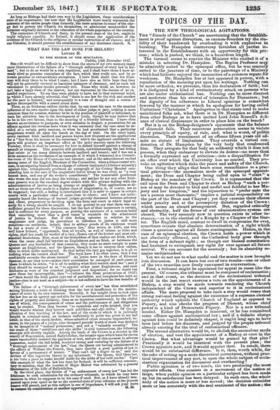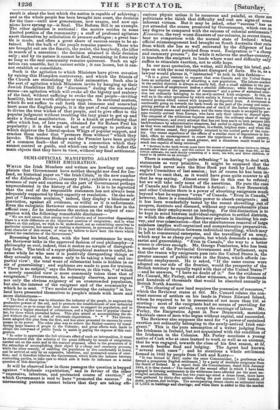TOPICS OF THE DAY.
THE NEW THEOLOGICAL AGITATIONS.
THE " i friends of the Church" are ascertaining that the Establish- ment s proof against disruption, as cannon-founders try the sta- bility of their handiwork by overloading it with explosives to bursting. i The Hampden controversy furnishes all parties in- terested n the Establishment with an opportunity for this pro- cess ; which is pushed, we think, to a hazardous length. The turmoil seems to convict the Minister who excited it of a mistake in selecting Dr. Hampden. The Regius Professor may be admirably suited to the episcopal office, but he was scarcely suited to the juncture of time, or to the patronage of a Ministry which had hitherto enjoyed the immunities of a common repute for weakness. Dr. Hampden has at last appeared in person, with a repudiation of the meaning put upon his writings. Nothing can
is disfigured orthodox, we presume, than his declaration of faith; but it s disfigured by a kind of recriminatory attack on persons who are also under ecclesiastical ban. Nothing can be more discreet and moderate than his avowal of toleration for Dissenters ; but the dignity of his adherence to Liberal opinions is somewhat lowered by the manner in which he apologizes for having called Unitarians "Christians." Apologetics in that strain tend to make uninitiated folks ask, what there is in Dr. Hampden so different from other Bishops as to have incited Lord John Russell's defi- ance of clerical displeasure in order to place him on the bench? But it is on the Bishop-designate's opponents that the balance of discredit falls. Their rancorous persecution seems to violate every principle of equity, of rule, and, what is worst, of politic discretion. Their resentment of an offence fifteen years old ad- mits no statute of limitations. They override a virtual con- donation of Dr. Hampden by the very body that condemned him. They arrogate for that body an authority which it does not possess, when they endeavour to elevate its decree—no more than a formally expressed act of criticism—into a disqualification for an office over which the University has no control. They pro- voke an agitation which risks the peace and safety of the Church.
One thing they allege that bears some resemblance to a prac- tical grievance—the anomalous mode of the episcopal appoint- ment; the Dean and Chapter being called upon to " elect " a Bishop at the mandate of the Crown. It is represented that the call upon the Dean and Chapter to elect as Bishop " such a per- son as may be devoted to God and useful and faithful to her Ma- jesty and her kingdom," and the injunction to "prefer unto the see a person meet thereunto," implies a judicial responsibility on the part of the Dean and Chapter ; yet they exercise their choice under penalty and at the peremptory dictation of the Crown : which seems an absurd arrangement. But, regarded critically and abstractly, half the forms of our administrative system are absurd. The very anomaly now in question exists in other in- stances,as in the election of a Knight by a Chapter of the Gar- ter. The English mind, content to dwell in compromise for ever, sometimes resents that absolute determination of a right which closes a question against all future contingencies. Hence, in the case of an episcopal election, the Crown holds a power which is not absolutely affirmed, and the Cathedral body goes through the form of a defunct right ; as though our blessed constitution had hesitated to extinguish any right for ever spinal all future revival. We can account for the anomaly ; but its absurdity re- mains undiminished.
Yet we do not see to what useful end the matter is now brought into discussion. It can have but one of two results—one or other of the two remedies now freely canvassed in conversation.
First, a tribunal might be appointed for appeal in cases like the present. Of course, the tribunal must be composed of ecclesiastics; and in that event, as the decision of the ecclesiastical tribunal would in the last resort exercise a veto on the appointment of a Bishop, a step would be made towards rendering the Church independent of the Crown and superior to it in ecclesiastical affairs. The mere proposal to take such a step would rouse that strong national feeling against the existence of a supreme clerical authority which upholds the Church of England as opposed to Popery, and also checks the progress of Dissent, whose chief power is a kind of Democratic Popery. Nor is a new tribunal needed. Either Dr. Hampden is innocent, or he has committed some offence against ecclesiastical law ; and if a definite charge against him could be definitely shaped, it ought long ago to have been laid before his diocesan, and judged by the proper tribunal already existing for the trial of ecclesiastical offences. The second alternative would be, to abolish the anomalous mode of election, and vest the appointment of a Bishop at once in the Crown. But what advantage would be gained by that plan? Practically it would be identical with the present plan ; the Crown appoints now, and it would appoint then. In result, there would be no substantial difference. Is it, then, worth while, for the sake of setting up a more theoretical correctness, without prac- tical improvement of any sort, to open the wholesubjeet of eccle- siastical organization for discussion and overhauling ? Public agitation is of two kinds, the two producing the most opposite effects. One consists in a movement of the nation at large, when public opinion on a particular subject has been made up but its satisfaction has been delayed. In such case, the whole body of the nation is more or less moved ; the decision coincides inure or less accurately with the real sentiment of the nation ; the
result is about the best which the nation is capable of achieving ; and as the whole people has been brought into court, the decision for the time—until new generations, new usages, and new opi- nions have sprung up—is final. The Reform Bill is an example. The other agitation is sectional : the motive resides in some limited portion of the community ; a staff of professed agitators exert themselves by solicitation to procure suffrages ; a great bus- tle is made, and often a great share of success seems to be at- tained. But the bulk of the people remains passive. Those who are brought out are the fanatic, the zealot, the busybody, the idler in search of a sensation : the decision attained is their decision only ; and by its nature it cannot be final, remaining in force only so long as the real community remains quiescent. Such an agi- tation can unsettle, but it cannot settle ; it can loosen, but it can- not establish or consolidate.
Such is the agitation to which Ministers have given occasion by raising this Hampden controversy, and which the friends of the Church are stimulating by their animosities. Such also is the sort of agitation which Ministers invite by hanging up their Jewish Disabilities Bill for " discussion " during the six weeks' recess—an agitation which will evoke all the bigotry and zealotry of the land, without sufficing to evoke the real people—inviting hostility, but not worth alliance or support. In sectional matters, which do not suffice to call forth that immense and somewhat inert mass the English people, it is the part of real statesmanship to divine the true wishes of that people, and to give effect to the popular judgment without troubling the lazy giant to get up and make a formal manifestation. It is a knack at performing that office which has, of late years, obtained for Sir Robert Peel his popularity ; it is the want of tact or of courage to perform it which deprives the Liberal-spoken Whigs of popular support, and crushes them under that "pressure from without" which they invoke. The thirteen Bishops and the Premier have been guilty of a common fault—that of raising a commotion which they cannot control or guide, and which can only tend to defeat the main objects that they have in view, without any final settlement.
























 Previous page
Previous page